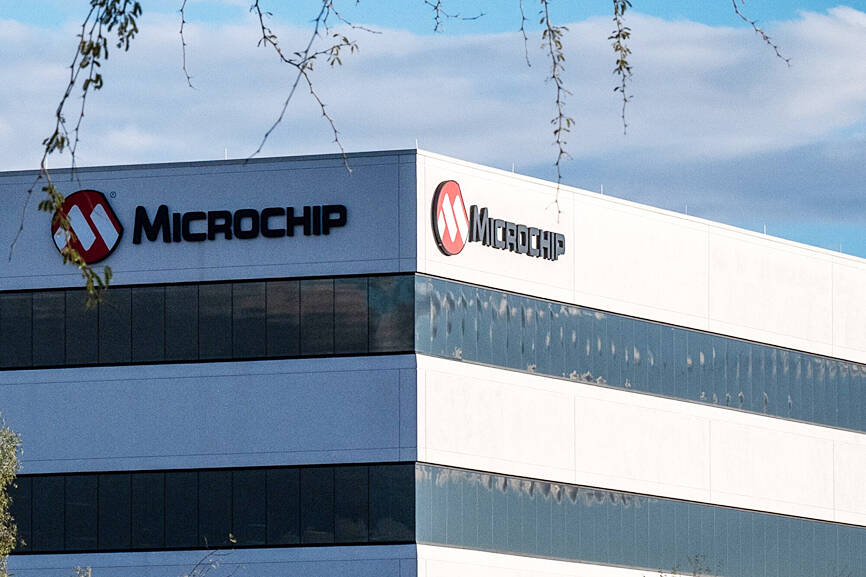Microchip Technology Inc yesterday said it has deepened its partnership with Taiwan Semiconductor Manufacturing Co (TSMC, 台積電), eyeing the foundry giant’s 40-nanometer manufacturing capacity at its Japanese fabs.
Microchip, a supplier of microcontroller units based in Chandler, Arizona, said the wafer capacity at Japan Advanced Semiconductor Manufacturing Inc (JASM) would improve its supply chain resilience and boost its ability to serve global customers regarding their automotive, industrial and networking applications.
JASM is TSMC’s 85 percent-owned manufacturing subsidiary in Kumamoto Prefecture.

Photo: Bloomberg
“Microchip’s reputation for providing responsible and reliable supply management is enhanced with this new TSMC manufacturing path,” Microchip senior vice president of worldwide manufacturing and technology Michael Finley said in a statement.
“Customers can have confidence when designing our products into their applications and platforms, with the support of resilient and robust manufacturing capabilities,” Finley said.
The partnership with TSMC would also ensure that customers have sufficient supply in the face of external factors such as frequently changing business conditions and natural disasters, Microchip said.
“This initiative with Microchip is further proof of TSMC’s commitment to supporting our customers’ long-term growth and innovation,” TSMC North America senior vice president of business management Rose Castanares said in the statement.
JASM’s first Kumamoto fab is scheduled to enter mass production in the fourth quarter, focusing on 40, 28, 16 and 12-nanometer chips.
The firm plans to begin construction of a second fab there by the end of this year to make advanced 6 and 7-nanometer chips.
The two Kumamoto fabs combined are expected to produce more than 100,000 12-inch equivalent wafers per month for automotive, industrial, consumer and high-performance computing applications.

Real estate agent and property developer JSL Construction & Development Co (愛山林) led the average compensation rankings among companies listed on the Taiwan Stock Exchange (TWSE) last year, while contract chipmaker Taiwan Semiconductor Manufacturing Co (TSMC, 台積電) finished 14th. JSL Construction paid its employees total average compensation of NT$4.78 million (US$159,701), down 13.5 percent from a year earlier, but still ahead of the most profitable listed tech giants, including TSMC, TWSE data showed. Last year, the average compensation (which includes salary, overtime, bonuses and allowances) paid by TSMC rose 21.6 percent to reach about NT$3.33 million, lifting its ranking by 10 notches

Popular vape brands such as Geek Bar might get more expensive in the US — if you can find them at all. Shipments of vapes from China to the US ground to a near halt last month from a year ago, official data showed, hit by US President Donald Trump’s tariffs and a crackdown on unauthorized e-cigarettes in the world’s biggest market for smoking alternatives. That includes Geek Bar, a brand of flavored vapes that is not authorized to sell in the US, but which had been widely available due to porous import controls. One retailer, who asked not to be named, because

SEASONAL WEAKNESS: The combined revenue of the top 10 foundries fell 5.4%, but rush orders and China’s subsidies partially offset slowing demand Taiwan Semiconductor Manufacturing Co (TSMC, 台積電) further solidified its dominance in the global wafer foundry business in the first quarter of this year, remaining far ahead of its closest rival, Samsung Electronics Co, TrendForce Corp (集邦科技) said yesterday. TSMC posted US$25.52 billion in sales in the January-to-March period, down 5 percent from the previous quarter, but its market share rose from 67.1 percent the previous quarter to 67.6 percent, TrendForce said in a report. While smartphone-related wafer shipments declined in the first quarter due to seasonal factors, solid demand for artificial intelligence (AI) and high-performance computing (HPC) devices and urgent TV-related orders

MINERAL DIPLOMACY: The Chinese commerce ministry said it approved applications for the export of rare earths in a move that could help ease US-China trade tensions Chinese Vice Premier He Lifeng (何立峰) is today to meet a US delegation for talks in the UK, Beijing announced on Saturday amid a fragile truce in the trade dispute between the two powers. He is to visit the UK from yesterday to Friday at the invitation of the British government, the Chinese Ministry of Foreign Affairs said in a statement. He and US representatives are to cochair the first meeting of the US-China economic and trade consultation mechanism, it said. US President Donald Trump on Friday announced that a new round of trade talks with China would start in London beginning today,